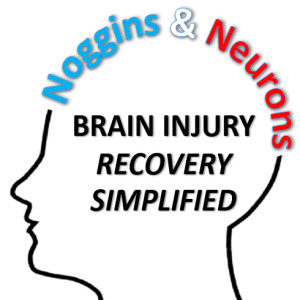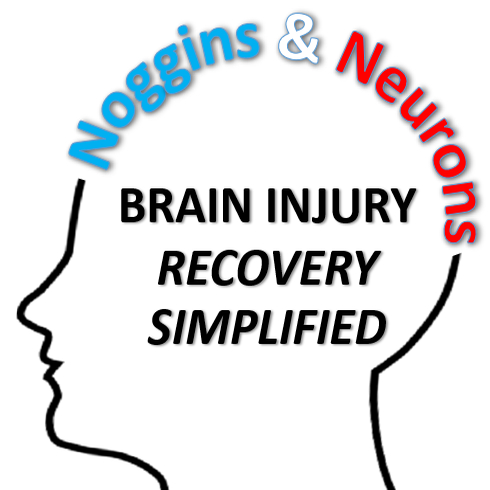Episodes

Monday Sep 27, 2021
Mary Warren: Vision and Brain Injury. Part II
Monday Sep 27, 2021
Monday Sep 27, 2021
Mary Warren: Vision and Brain Injury. Part II
Noggins And Neurons Facebook Group: CLICK HERE or scan below!
DEB: So sometimes when we’re working with someone who needs extra time, we might think it’s because of a motor problem, we might think it’s because of fatigue and maybe even memory, but it could be because they’re not visually taking in their environment properly.
- WARREN: Yeah. That’s exactly it. That’s why it’s important to screen right? Because if I have that client and I’m first seeing them and I screen for their acuity and I screen for their contrast and I look at whether they can move their eyes together and I look at their visual attention...If I do that basic screening and get a sense of what are their strengths in using their visual system and what are their weaknesses, then I can further assess their performance in an ADL or something else and I can help start to distinguish, you know, is this vision or is it something else? If it’s vision one of the ways I can test it is just by making whatever they’re doing more visible to them. I can add task lamp to spotlight it, I can simplify it, I can get rid of all the pattern that’s around it, whatever I need to do, if I can create it and make it more visible and then watch how their behavior changes.
EPISODE SUMMARY: This episode of NOGGINS & NEURONS: Stroke and TBI Recovery Simplified is Part II of our conversation with vision expert, Dr. Mary Warren. In this episode we learn about:
- Three common environmental barriers that add visual stress in home environments are too much pattern, incorrect lighting and not enough contrast
- Warren’s belief that people improve following brain injury when they can successfully engage in their occupations again (The premise of occupational therapy practice), stimulating neuroplasticity and avoiding depression
- Behaviors that mask vision deficits - looking at the feet and head positions when walking as signs of vision deficits
- How cognition and vision are intertwined. Signs that look like frontal lobe injury (decreased initiation, increased time to complete a task and indecisiveness) could indicate a vision problem
- The Brain Injury Visual Assessment Battery for Adults (biVABA) for assessing vision following stroke and brain injury. It aligns with the visual perceptual hierarchy, determines strengths and weaknesses of vision and guides intervention using the strengths to compensate for weaknesses
- Warren’s continuing education course on vision
- Warren’s perspective on how OT services are judged by the clients we serve
- Low Vision Rehabilitation Graduate Certificate program was started by Dr. Mary Warren with Beth Barstow, PhD, OTR/L, SCLV, FAOTA
- Vision declines but visual attention doesn’t have to! Engaging in activities that require reactivity can help improve visual attention, memory and driving in older adults
- Visual deficits associated with vestibular system impairments and where to look for help
- The question that helped Dr. Warren establish the most important professional relationship of her career
We hope you feel as inspired as we do after listening to this episode on vision.
As always, we want to hear your top takeaways!
LINKS TO ARTICLES, BOOKS AND OTHER IMPORTANT INFORMATION:
Brain Injury Visual Assessment Battery for Adults (biVABA)
visABILITIES REHAB SERVICES, INC. Continuing Education
Low Vision Rehabilitation Graduate Certificate program at University of Alabama at Birmingham
Chapter 24: Evaluation and Treatment of Visual Deficits After Brain Injury. (2018). In Pedretti’s Occupational Therapy Practice Skills for Physical Dysfunction (pp. 594–630). Elsevier.
Questions and Comments about the podcast?
Donate to The Noggins And Neurons Podcast with your PayPal app

- Eye-Search Therapy Online vision correction game
- Durham Reading & Exploration Training (DREX) Durham Reading & Exploration Training (DREX)
Pete’s blog, book, Stronger After Stroke, and talks.
Deb's OT Resources:
- Deb's OT resources
- The OT’s Guide to Mirror Therapy
- Tri-Fold Mirror (US address only)
- Occupational Therapy Intervention: Scavenger Hunt Visual Scanning for Adults
REQUEST TO BE A GUEST ON NOGGINS & NEURONS. If you’re passionate about stroke recovery and have information or a story you believe will help others, we’d love help you share it on the show. Complete the guest request form below and let’s see if we’re a good fit! Guest Request Form
MUSIC:
“Soft Inspiration” by Scott Holmes/Scott Holmes Music/scottholmesmusic.com




No comments yet. Be the first to say something!